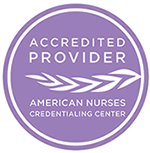Designing Nursing Curricula for Competency-Based Education: The Role of Progression Indicators
Attendance for this live webinar is limited to 1,000 participants. Individuals placed on the waitlist will receive additional information as the webinar date approaches. A recording will be available shortly after the session airs.
Webinar Details
Competency-Based Education (CBE) is reshaping nursing education by shifting the focus from what students know to what they can do. This approach emphasizes descriptive, observable behaviors that support learning, competency development, and readiness for professional practice. Central to this shift are Progression Indicators (PIs), which translate sub-competencies into clear, observable behaviors that faculty, preceptors, and students can use as a shared roadmap for learning.
This webinar will explore how PIs support backward curriculum design, clarify expectations, and align assessments with the behaviors students must demonstrate in practice. By making competence visible, PIs help educators foster transparency, strengthen experiential learning opportunities, and promote equitable readiness for professional nursing practice.
Outcomes:
- Analyze the role of progression indicators in competency-based education and how they guide learning and assessment.
- Demonstrate how to align program outcomes, course objectives/learner outcomes, and assessments with progression indicators to support learner development.
- Design strategies for using progression indicators to provide consistent, transparent, and developmentally sequenced assessment of student competency.
Note: Recording of the webinar will be available soon after the webinar airs. Visit AACN's On-Demand Webinars to watch.
Speakers

Dawn Mueller-Burke, PhD, CRNP, NNP-BC
Assistant Professor/Neonatal Nurse Practitioner
University of Maryland Baltimore
University of Maryland Medical Center
Dr. Mueller-Burke has a clinical focus in the Neonatal Intensive Care arena where she spent most of her career as a Neonatal Nurse Practitioner. She is a graduate of the University of Maryland School of Nursing (UMSON) PhD program with a focus in neonatal neurophysiology. She completed a postdoctoral fellowship at Johns Hopkins University in a developmental genetics laboratory with a focus in stem cell biology. Her research sought to better understand neonatal brain injury and to identify potential interventions, including hypothermia and stem cell therapy to improve outcomes after neonatal brain injury. She shifted her focus to leadership and educational-based endeavors once joining the faculty at the University of Maryland School of Nursing in 2004, where she teaches across degree programs, specifically in the NNP program.
She is nationally certified as a Neonatal Nurse Practitioner, with a per diem practice in the NICU at the University of Maryland Medical Center. In 2011 she served as the Faculty Chair of the DNP Transition Task Force incorporating the AACN Essentials, leading all the APN Master’s specialties at UMSON to the doctorate (DNP) beginning Fall 2014. She is currently the Chair of the Curricular Revisions Taskforce at UMSON, transforming entry and advanced practice programs to the 2021 Essentials. As an AACN Essentials Champion and Coach, and the co-lead for the AACN Essentials Curricular Workgroup, as well as a member of the NONPF Curricular Leadership Committee, she is part of the national dialogue and consultant on curricular revisions and speaks at various venues around implementation of the AACN Essentials and the move to competency-based education.

Jacquelyn McMillian-Bohler, PhD, APRN
Assistant Clinical Professor
Director, Institute for Educational Excellence
Duke University
Dr. Jacqui McMillian-Bohler is an Assistant Professor and the Director for Educational Excellence at the Duke University School of Nursing. She received a BSN from the University of North Carolina at Greensboro, an MSN in Nurse-Midwifery from Vanderbilt University, and a PhD in Nursing Education from Villanova University. Grounded by her Masterful Educator Model, she mentors faculty and presents nationally on faculty development, fostering inclusive learning environments, and employing impactful teaching strategies. Her efforts extend to guiding nursing programs toward competency-based education and researching effective teaching practices and health equity. Beyond academia, she advances health equity through Cultural Intelligence workshops and a culturally concordant doula training initiative.
Pricing and CE Credit
This webinar is free to deans, faculty, staff and students from AACN member schools of nursing. All non-member audiences will be required to pay a $59 webinar fee.
Continuing Nursing Education
One nursing continuing professional development (NCPD) credit is associated with this webinar; attendees must be present for the entire webinar and complete the evaluation to receive a certificate of completion.

The American Association of Colleges of Nursing is accredited as a provider of nursing continuing professional development by the American Nurses Credentialing Center’s Commission on Accreditation.
